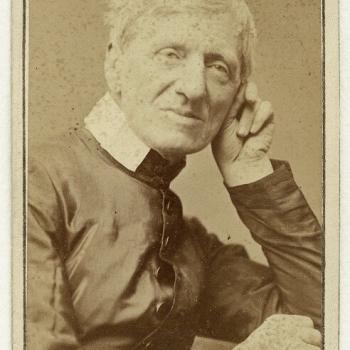
As a young Christian, I was taught about spiritual growth. I couldn’t have told you exactly what that was at the time, but it was emphasised as important. Inherent in the idea of spiritual growth was the unavoidable implication that there is something insufficient about me, and that I needed to change. We were exhorted to ‘run the race’ and ‘aim for the prize’, which is Biblical language, but if not carefully framed, it can give people the idea that they have to strive to be better. This kind of language can foster a sense of lack; it certainly did so in me.
At the age of 19, I made the sideways shift into Charismatic renewal and carried my striving mentality with me. The large Pentecostal church I attended emphasised the Baptism of the Spirit, and as I didn’t speak in tongues or use any of the gifts of the Spirit listed in 1 Corinthians 12:1-11, I felt like I was second-rate. They had something I didn’t, or at least that is what I believed at the time.
Thus began an intense period of ‘seeking’ in which I would beg God for ‘more’ of him. I prayed for a couple of hours every day, asking for a ‘breakthrough’ that would elevate me to a new spiritual plane. Eventually, I went forward for prayer at my church and the pastor, who didn’t know me, said in tones overflowing with compassion – ‘You’ve been SO thirsty for God, of course he will fill you with his Spirit!’. At the time I took that as an encouragement, even if the reassuring message was filtered through a Pentecostal theological lens. That said, the pastor’s words reinforced the idea of Christian ‘haves’ and ‘have-nots’ – those who are baptised in the Spirit and those who are not. I spoke in tongues that night for the first time, which made me a ‘have’ in Pentecostal terms, but I was still tormented by a gnawing sense of lack.
Despite further breakthroughs, I still saw spiritual experience in terms of having less or having more, and I wanted far, far more. As far as I was concerned, knowing God should be the most life-giving experience a human being could have, and I wasn’t going to stop asking for greater ‘closeness with God’ until that became my reality.
I began to prophesy, discern, have words of knowledge, and all the rest of it, but I wasn’t satisfied by sporadic moments of divine connection – I wanted continual awareness of ‘God’s presence’, from the moment I woke till the moment I slept, each and every day. My ongoing quest resulted in some ‘breakthroughs’, but any semblance of growth was framed by the same sense of lack. Now that my dreams of closeness with God were more ambitious, the sense of lack I felt was even worse. I wanted to enter my spiritual ‘promised land’, but by continually striving for something, I was continually reminding myself that I wasn’t ‘there’.
To cut a long story short, I did eventually experience a radical shift in my spiritual awareness. Instead of feeling ‘God’s presence’ from time to time, I became tangibly aware of him within and around me in a way that has never diminished. 27 years later, this unbroken communion with God continues. At the time it happened, I considered it a blessing I’d received that I could pass on to others, but my positive motivations were mixed in with a need to feel important, which in a young man with low self-esteem quickly became toxic.
Abandoning a Sense of Lack
While yoked to ideas of plenty versus lack, of presence versus absence, no expression of spirituality can ever be generous. It can never be inclusive, because such a spirituality sees people as either having or lacking some kind of blessing. After all my years of striving, I did find the spiritual abundance I was looking for, but not because God rewarded me with a special anointing.
Over the years, I’ve come to understand that moments of deepening spiritual experience reflect a growing awareness of what we already have – complete union with God. We are simply tuning in to what lies within each of us – Christ is us, the hope of glory.
There is no distance between God and us – any barriers I tore down were barriers I had erected in the first place, largely because of poor theology. As a child, I inherited a string of harmful lies:
· That we are deserving of eternal torment.
· That we are fundamentally sinful (rather than fundamentally good but struggling with sin).
· That when I sinned, God removed his presence from me until I repented.
· That I was not good enough for God.
As a Charismatic, I embraced a new set of lies to hinder me:
- That there are ‘haves’ and ‘have nots’ in the Church.
- That there are special blessings to seek out, and that only the most devoted will receive them.
- That God ‘turns up’ during times of prayer or during services (which implies he is absent at other times).
I went on to join the Word of Faith movement, from whom I ingested further unhelpful ideas:
- That those who have faith can command health in their bodies.
- That monetary wealth is evidence of God’s blessing.
What is spiritual growth?
If spiritual growth isn’t about climbing some kind of ladder to get closer to God, is there a healthy way to define it? For me, spiritual growth is all about increasing awareness of our union with God. In fact, we are all expressions of the love of God, and he would never suffer separation from a single one of us.
The Bible does call us to growth and transformation, but transformation happens as our awareness of union with God and with others blossoms. Striving does not result in growth. Feelings of lack, hunger, thirst, and desperation are of no use whatsoever, because they distort the truth, which is that God has already given us everything we need to lead rich, loving lives.
Paul explicitly lays out the process by which we grow in Romans 12:2,
Do not conform to the pattern of this world, but be transformed by the renewing of your mind. Then you will be able to test and approve what God’s will is—his good, pleasing and perfect will.
We are transformed (we grow and change) by the renewing of our minds. How does this play out? Through dwelling on the truth that the work of Christ is complete, that in the depths of our beings we have all we will ever need, and that we are already unified with God and others. As these truths sink in, they unlock that which is already ours – our awareness deepens, and with it our gratitude, our peace, and our joy. A person who truly knows they are loved unconditionally by the source of all love will never feel a sense of spiritual lack again. That has certainly been my story.
Note from the author:
Anyone wanting to read more about my journey can buy How to Know God on their regional Amazon site. I wrote it under the pseudonym, James Bewley, along with a number of other books on Christian topics.
5/8/2025 12:17:08 AM





